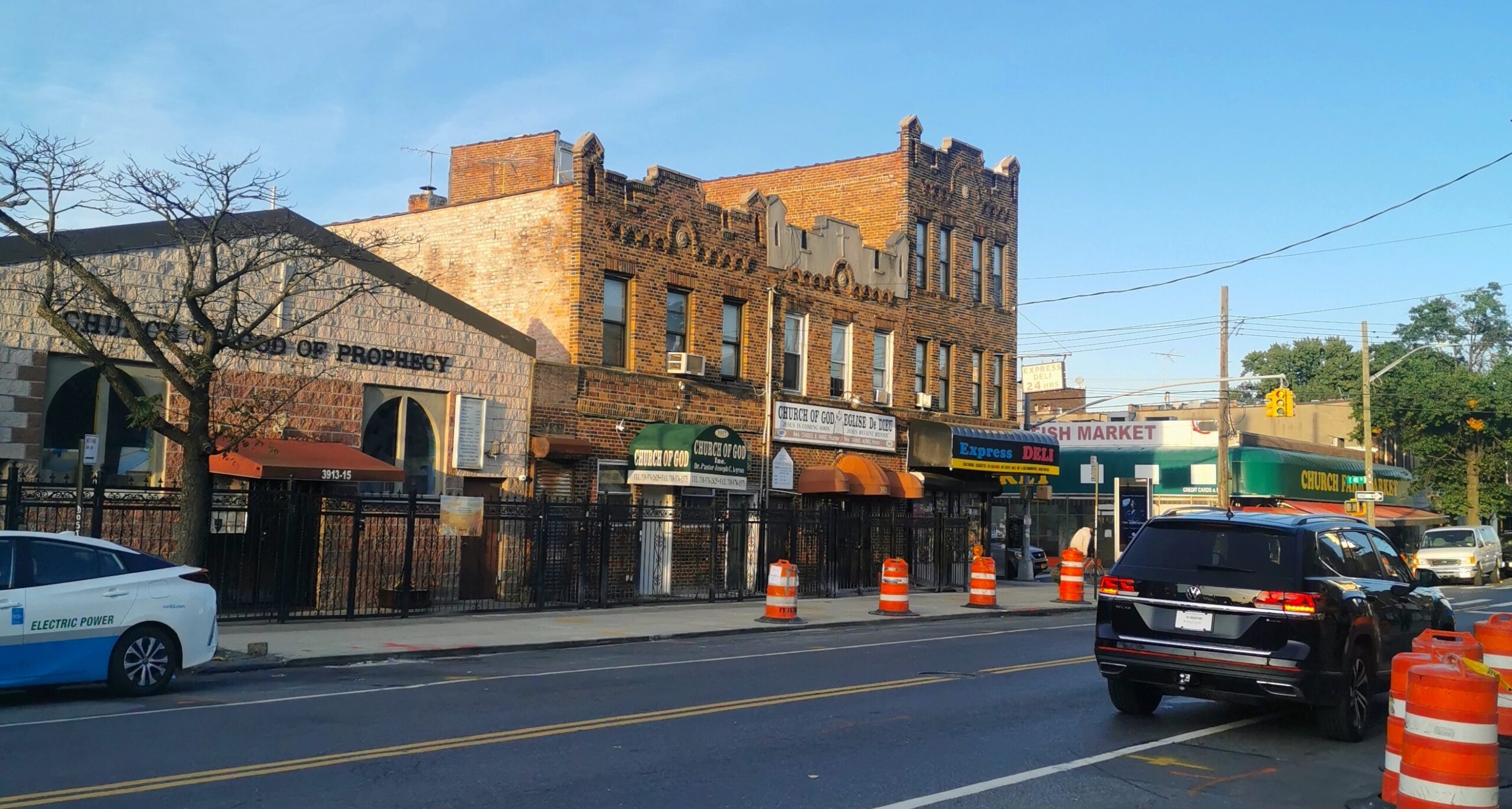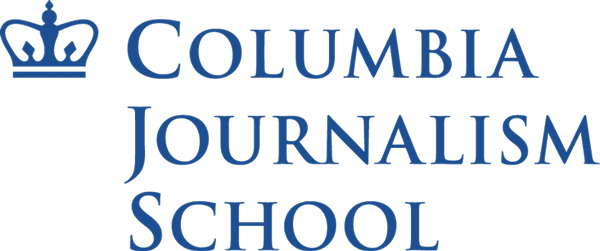
Many Christian houses of worship line up along Church Avenue in Brooklyn. The new mosque in East Flatbush is just around the corner. (Credit: Ariane Luthi)
When the sun set over Church Avenue in Brooklyn on an early October weekday, Shafiul Azam touched his head down on the soft green carpet of the new mosque in the neighborhood.
A digital panel in the corner of the room indicated the five prayer times of the day, as a young Imam from Bangladesh led the sunset service for a group of men. Until recently, they congregated in the basement of a private house. Masjid Baitus Salam is more modest than the many churches and a synagogue nearby. But it offers a permanent prayer space for the growing Muslim population of the area in East Flatbush known as Little Caribbean. In a two-story townhouse and framed by family homes, the mosque features separate rooms for women, washing amenities and a place to store supplies for a bi-weekly food pantry.
“This neighborhood is very good. It’s not racist,” said Azam, 44, who is an IT professional and the secretary of the mosque. “We didn’t face any trouble. It’s a very big blessing and luck.”
After years of institutional discrimination in the context of the “war on terror,” Muslim New Yorkers have stepped out of the shadows. Azam and what he calls his “brothers from Bangladesh” bought the East Flatbush house and moved their prayer place up from the underground. Brooklyn has the most religious diversity in the United States, a county-level survey by the Public Religion Research Institute PRRI found in 2020. The U.S. Religion Census counted 69 Muslim congregations. Brooklyn is also the borough with the most mosques, the presence of which has been growing across the U.S. overall, according to the Institute for Social Policy and Understanding that studies American Muslims.
Citywide, the Adams administration introduced a new rule in August that allows Muslim communities to amplify their call to prayer on Fridays and during Ramadan, formalizing the previous ad hoc practices that had depended on local arrangements and permits. The development reflects the growing political power of Muslims in the city, said Katherine Merriman, 37, who directs the Islamic study program at the University of Detroit Mercy and leads Muslim history tours of New York City.
New York has long had an Islamic presence that spans from Muslims who were enslaved during colonial times to the emergence of a more visible community at the end of the 19th century. However, Islam was mostly treated “as a threat or exotic delight,” Merriman said. This still applied when African-Americans started reclaiming Islam as a part of their identity and immigration from Muslim majority regions increased after 1965.
“A big shift happened when Muslims stopped being defensive,” Merriman said, referring to changing tactics against islamophobia. Directly after 9/11, older generations fought for understanding and acceptance. Over time, Muslim New Yorkers started insisting on their rights, Merriman said. “These young people who grew up during 9/11 are no longer young people. They are much more assertive.”
Asad Dandia, 30, experienced the targeting of Muslim New Yorkers after 9/11 first-hand. He was one of the plaintiffs in a case brought by the American Civil Liberties Union against the New York City Police Department over a spying program on Muslim organizations. Dandia’s neighborhood help group was infiltrated by an officer in 2012.
“It was a dark time,” said Dandia, co-founder of Muslims Giving Back. “I would not wish that on my worst enemy. You didn’t know if the guy praying next to you was a government agent.”
When the lawsuit was settled in 2017, it changed the city’s policies. New York introduced more civilian oversight of the police to prevent discrimination. In February, the first Muslim-American became NYC’s independent civilian representative to the committee that Dandia’s lawsuit helped strengthen.
A younger generation of Muslims threw themselves into politics. Representation improved, Dandia said, referring to Brooklyn’s Shahana Hanif, who joined the New York City Council as the first Muslim woman last year. Yusef Salaam, a man who relied on his Muslim faith during years of wrongful incarceration in the case of the Central Park Five, won the City Council primary race in Harlem in July, which secured him a seat.
The escalation of the Israel-Hamas conflict is putting advances in protecting all New Yorkers from discrimination to the test.
“The climate since 10/7 in terms of rhetoric is starting to resemble what we saw in the days and months after 9/11 for sure,” Asad Dandia wrote in an email in late October. “We’ve already seen an uptick in hate crimes as well. I think the representation and safeguards are there, but they are also very fragile.”
In East Flatbush, the opening of the new mosque has not prompted any notable reaction in the neighborhood at large. “I have not heard any complaints or compliments for that matter,” Rodrick Daley, chair of the district’s community board, said in an email.
When Shafiul Azam prepared for sunset service, three NYPD traffic officers stopped by Masjid Baitus Salam to pray during a short break in their shift. A neighbor inquired about the mosque and was invited to visit.
But discrimination against Muslims is on the rise, including in New York. “Islamophobia is hate. Plain and simple,” Mayor Eric Adams posted on X (formerly Twitter) in late November, after a Halal food vendor was harassed on the Upper East Side. “This vile, disrespectful rhetoric has no home in our city. We reject it — and we’re glad to see we’re not alone.”
About the author(s)
Ariane Luthi is a Swiss journalist and graduate student at Columbia School of Journalism.



